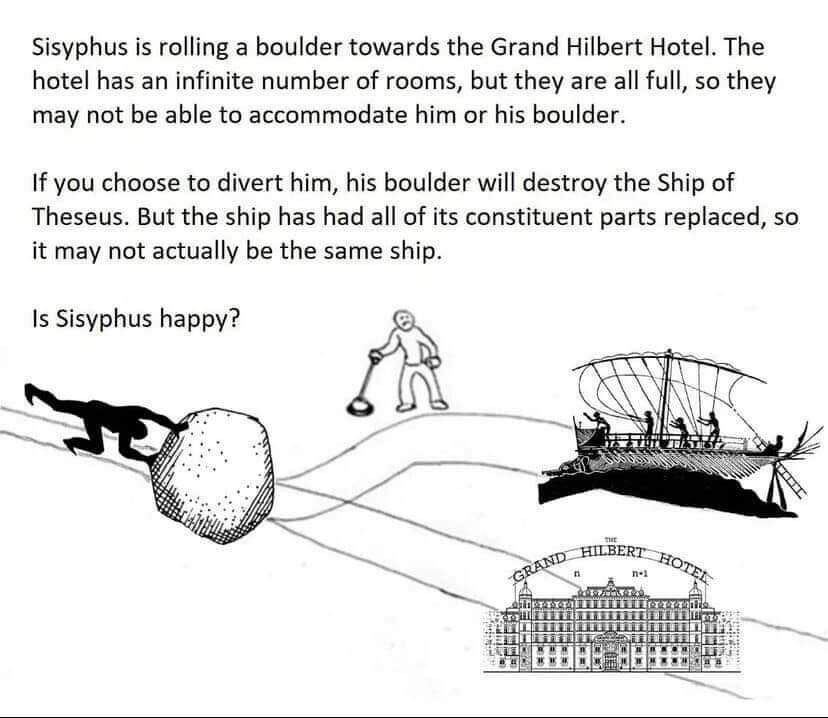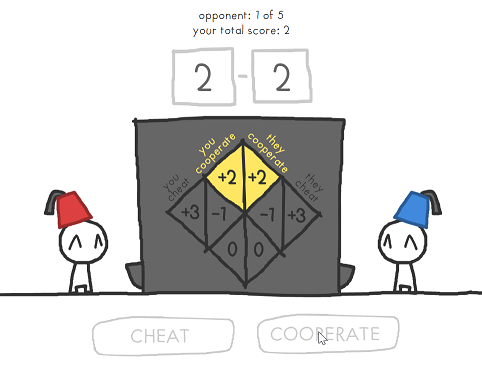What Links Here?
Outbound Links
- Darkside
- 🖼️ llama.png
- Explorable Explanation about the Prisoner's Dilemma
- The Evolution of Trust
- 🖼️ The Evolution of Trust
- CAN BAD MEN MAKE GOOD BRAINS DO BAD THINGS?
- explanatory notes
- increasingly absurd set of trolley problems
- 🖼️ Sisyphus, Hilbert’s hotel and the Ship of Theseus
- ⭐ infinity
- ⭐ Paradox
- Wikipedia: Prisoner's Dilemma
- How stuff works: The Trolley Problem
- Wikipedia: Trolley Problem
- CAN BAD MEN MAKE GOOD BRAINS DO BAD THINGS?
- Explanatory Notes for 'Can Bad Men Make Good Brains Do Bad Things?'
- Darkside (Tom Stoppard)
- Trilemma
- ⭐ Paradox
- ⭐ a-simple-puzzle
- ⭐ what-should-i-do-now
Dilemma
Ethics Man Did What Had To Be Done
—Darkside
A dilemma (Di - Lemma, meaning "two" lemmas) is a choice between two lemmas. Which lemma do you prefer? This lemma or that lemma?
To understand dilemma then, we have to understand "lemma."
What precisely is a lemma?

It's not quite the same as a llama. (And it's even less like an alpaca.)
A lemma is a 'subsidiary' theorem, a quasi-theorem, or (more helpfully) a direction or bearing.
A dilemma is a choice between two bearings. The consequences of choosing one bearing or another are not fully knowable. We must choose anyway.
Some writers stress that both outcomes are bad. This is not necessarily true. What is true is that both outcomes are not fully known. The uncertainty itself is bad.
If you're going to get by in the world today (and I believe that getting by in the world today is something that you are willing to attempt) then it will be helpful if you understand a few of the classic dilemmas.
Classic Dilemmas.
- Prisoner's Dilemma
- The Trolley Problem
The Prisoner's Dilemma
The prisoners dilemma! What a pickle! What a thing! Where do we start?
Two people have committed a crime together, and were equal masterminds in the planning and performance of the deed. Let's call them Jake and Laribee, though their names, and indeed, the particulars of their crimes, are unimportant.
The prosecutors have nabbed the duo, but don't yet have enough evidence to secure a conviction on the principal charge. All of the usual 'good cop/bad cop' shenanigans have failed, and thus the prosecutors have decided to turn to the literature on Game Theory to see what they should attempt next.
Jake and Laribee are each placed in solitary confinement (separately, not together) and they have absolutely no means of communicating, not even the traditional tapping out of Morse code on the plumbing system.
So the prosecutors make a deal with each of them.
- If Jake and Laribee testify against each other, each of them will serve 2 years in prison
- If Jake betrays Laribee but Laribee remains silent, Jake will be set free and Laribee will serve 3 years in prison (and vice versa!).
- If Jake and Laribee both remain silent, both of them will only serve 1 year in prison (on a lesser charge).
They are both offered this deal. And they both know that their co-conspirator has also been offered this deal. And they also know that their co-conspirator knows that they have been offered this deal. And so on, in infinite regress.
What should Jake do? What should Laribee do?
It depends what sort of a guy Jake is. But Laribee knows what sort of a guy Jake is. And Jake knows what sort of a guy Laribee is. So it depends on a lot of things.
But the main thing it should depend on (according to game theory) is this: have they been in this kind of situation before? And even more importantly: are they likely to be in this kind of situation again?
Anyway, if you find Jake and Laribee's whole situation particularly fascinating then you ought to read whatever you can about Game Theory. It's packed with that sort of stuff.
Here is an Explorable Explanation about the Prisoner's Dilemma by the amazing Nicky Case that shows how this situation gives rise to the value of trust. (In short: if they go through this situation many many time, and they have some level of trust in each other, then they will each end up better off then they would if either or both of them lacked trust.
Trolleyology
But no tour of the great dilemmas, however brief, could pretend to be complete unless it stops to admire The Trolley Problem.
The Problem with Trolleys. Where to begin?
Go with me now. Take my hand. Are you holding my hand? Good. Hold it tight. We are travelling to a scorching hot desert of a punishingly warm summer's day. He we are now. In the middle of nowhere: a flat expanse, with desert stretching away in every which.
And here, in this barren landscape, there is nothing but The Railway Track.
A straight track, with one side track, and a junction.
And any moment now the Desert Express is going to come barrelling along at top speed. No matter what we try, we will not be able to stop that train.
But what's this! Oh no! On the track straight ahead, there are FIVE PEOPLE, tied to the track. Nothing we do can untie them.
If we do nothing, they will surely die.
Fortunately we have noticed that there is a switch. And if we press the switch, the train will be diverted at the junction and instead of ploughing into and killing the five people, it will head harmlessly along the side track. Phew. That's a relief.
So we move toward the switch. But suddenly we realise. Oh no! There is one more person tied to the track. They are tied to the side track.
If we divert the train down the side track, then we will be guaranteeing that this person dies. But if we let the train continue on the main track, then FIVE people will die.
What do we do?
Do we divert the train, killing 1 and saving 5? The blood of that one will surely be on our hands. He's looking at you now. Staring you right in the eye. Then do we do nothing? Killing 5 and sparing 1, but feeling safe in the belief that none of this had anything to do with us?
Taken to its logical extreme, we find the ultimate reformulation of this idea in the essay CAN BAD MEN MAKE GOOD BRAINS DO BAD THINGS? (and its equally thrilling explanatory notes)
The Trolley Variations
At Neal.Fun there is an increasingly absurd set of trolley problems that are worth your time. Beyond Neal.fun there are many more trolley variations scattered throughout human file systems and brains.

This one ☝️ is a narcotic designed to hook me in particular — it combines the trolley problem with the story of Sisyphus, who is doomed for eternity to push a boulder up a hill only to have it roll down the other side, over and over, with the concept of Hilbert’s Hotel, and the paradoxical “Ship of Theseus”.
External Links
- Wikipedia: Prisoner's Dilemma
- How stuff works: The Trolley Problem
- Wikipedia: Trolley Problem
- CAN BAD MEN MAKE GOOD BRAINS DO BAD THINGS?
- Explanatory Notes for 'Can Bad Men Make Good Brains Do Bad Things?'
- Darkside (Tom Stoppard)
- Trilemma
